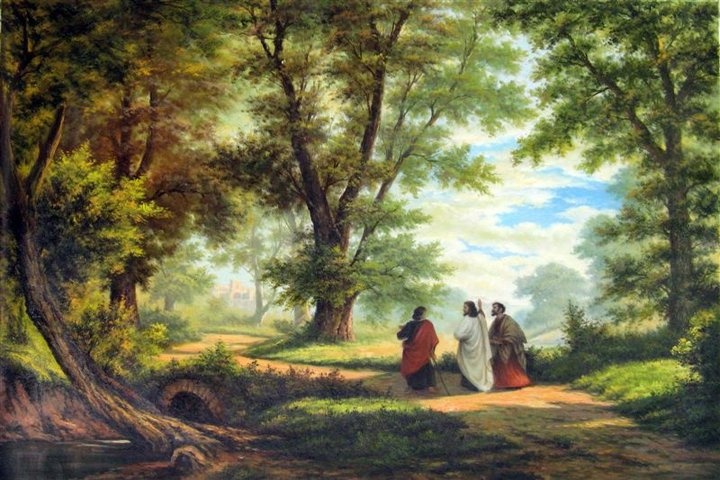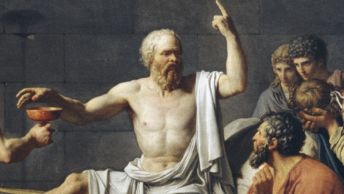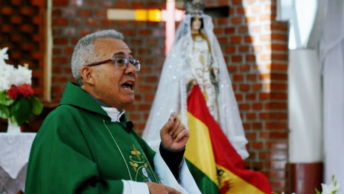 We all, each one of us, are walking on our individual journeys through life dealing with our questions either by ourselves or with others. Sometimes it is difficult to deal with our questions. Sometimes our questions are difficult. Sometimes our difficulties cause us to question. Many times we ask: “Where is God in all of this?”
We all, each one of us, are walking on our individual journeys through life dealing with our questions either by ourselves or with others. Sometimes it is difficult to deal with our questions. Sometimes our questions are difficult. Sometimes our difficulties cause us to question. Many times we ask: “Where is God in all of this?”
Last Sunday’s Gospel account was about the disciples locked up in the Upper Room out of fear and then Jesus’ appeared among them. The Gospel for the Third Sunday in Easter (Lk 24:13-35) is about two disciples dejectedly walking, journeying, from Jerusalem to a nearby hamlet called Emmaus and then Jesus appeared among them.
The thing that is curious to me is that in this account the important point revolves around recognition of Jesus. We find this group of disciples at first failing to recognize Jesus and in the end they recognize Him. What happened? Why did they at first think He was a stranger and later come to realize who He really was?
What seems to be controlling deals with the question of how we see people. Obviously we’re not talking here about simply seeing with our eyes, we’re talking, rather, about seeing with our hearts. We’re dealing with seeing at deeper levels of knowing and understanding.
That’s something we all know about, isn’t it? For instance, recall how you saw and understood your parents when you were a child. Then think about how you saw your parents when you were a teenager. The way you saw them changed, didn’t it? Now think about how you as an adult see and know and understand your parents. It’s hugely different, isn’t it.
What changed? Did they change, or did you change? I think we all immediately know it is we who changed, not our parents. Their love, care, and concern for us remained constant. It was our acceptance of their love, care, and concern that went through different stages. It was the way we saw them that changed. And maybe the way we see them even now is still changing.
Isn’t that likewise true with others whom you love? Isn’t it true with your friends? I think it was also true with Jesus’ disciples.
Huge events have a big impact on the way we see, know, and understand other people. It’s likely that the parents, relatives, and friends of the young men and women in our Armed Forces see them now in a different light just a few years after they’re out of high school. I daresay these kids’ parents saw them one way when they were in high school and now see them in a wholly different way as they’re over in Afghanistan serving our country in the war against terrorism.
Back in 1941 a number of people had some very strong views of President Franklin Delano Roosevelt, views that were quite negative. On December 8, 1941, the day after the Japanese bombed Pearl Harbor, these people saw him quite differently, to say the least.
Huge events cause changes in the ways we see events. They change the ways we see people. Husbands see their wives quite differently after their first child is born, and wives likewise see their husbands in new ways.
The disciples walking on the road to Emmaus were talking about all of the stupendous events that had occurred surrounding the crucifixion and death of Jesus. They were terribly upset because they had thought Jesus of Nazareth was the Messiah that God had sent, and look what had happened! They were dazed and bewildered by it all; they were trying to make sense out of it all. Where was God in all of this, they wondered?
The Gospel account then takes us to the one thing that opened their eyes, the event that allowed them to make all of the connections, the central piece in the puzzle that opened their eyes. It was the breaking of the bread. The critical thing that occurred was when the “Stranger” who was among them took bread, said the blessing, broke it and gave it to them to eat. Suddenly their eyes of recognition were opened. They no longer saw Him with just their eyes, but they recognized him with their hearts. They saw Him with their newly awakened faith. They recognized him because they encountered Him in a totally different light. They saw him now in that event where He promised to be with them always.
Knowledge, you see, isn’t based simply on the acquisition of facts, information, and data. True knowledge is seeing things based on wisdom and understanding. Religious knowledge is seeing reality using the gifts of the Holy Spirit, particularly His gifts of wisdom, understanding, and knowledge.
Jesus comes to you and me in ways we least expect. Why is it that all of the saints and seers who are a part of our Catholic Faith speak of God’s coming to us in moments of surprise? We know that to be true, don’t we? We know of our own moments of surprise, our own moments of wonder, when suddenly we are aware of God’s presence to us, when out of the blue we hear what He’s saying to us.
This is why we need times of reflection. This is why we need to get out of the busy-ness of our days. We need to turn off all of the noise that’s hurled at us in this modern world of ours. For it is in moments of quiet reflection, when we’re out for a stroll, or when we’re in some quiet place where we’re allowed to reflect, that we begin to “see” Jesus and come into a deeper awareness of His presence to us.
To deny that He is in fact present to us is to deny the testimony of countless numbers of people who, down through 2,000 years of Christian history, tell us of their similar “walks to Emmaus”, tell us of their similar moments of coming to recognize Jesus and their encounters with Him.
May you soon have some time to make your own Emmaus awareness. And may you come to recognize Him not only in the breaking of the bread but in all those other moments where God tries to break in on our time and walk with us as we face all of the stupendous events life hurls at us. For without His presence with us we certainly will feel depressed and defeated. Without His presence we will not be journeying to a destination, we will simply be wandering.








